Shop for Dubias, Chicks, Chicks, and Reptile Supplies
We Roll Up Our Sleeves and Offer Live Crickets Online
The term "roll up your sleeves" is a way of life on our critter farm. From digging in the dirt, to slinging chicken manure for our black soldier fly larvae, to preventing crickets from turning into cannibals, we are always shoulder deep in something messy. But it's something that we've been doing for generations. And it's something that comes natural. We're down to earth people that enjoy the creatures that crawl and squirm, and we enjoy the company of any one that respects the fruit of their labor.
Shop Crickets
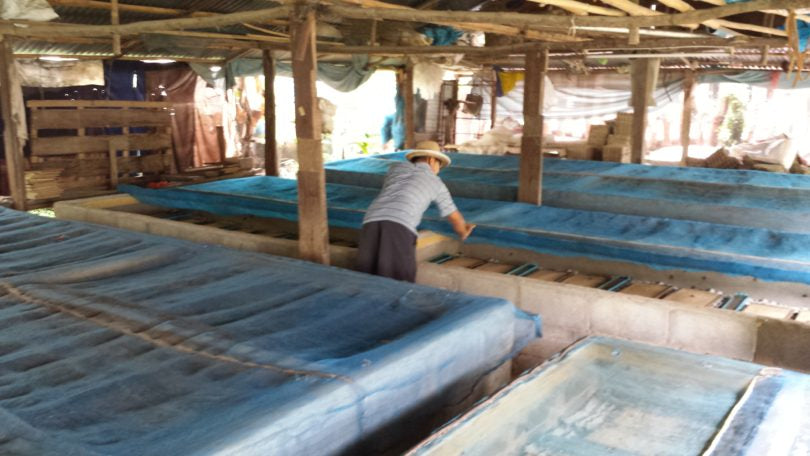
The clean crickets that we raise and sell are some of the happiest, healthiest, heartiest snacks on the internet. We raise them in Florida and Pennsylvania on home grown oranges and vegetation. This food source provides them with the best hydration and nutrition that growing crickets require. And not only does it keep them healthy at home, it makes them stronger and more tolerant to traveling across country. So you can expect healthy and lively crickets when they arrive to your home, all to benefit your bearded dragon diet, leopard gecko, or any other type of reptile or amphibian you're caring for.
Our crickets are the Acheta domesticus. And since I'm sure none of you know what that means, they are colloquially known as the house cricket. But we also offer banded crickets as well. We raise them in healthy environments, routinely rotating their bedding and environment to maintain sanitation, so that your pet gecko or dragon will have the healthiest food sources available. And due to this healthy environment, we're able to offer our live crickets online.
Crickets are prolific breeders. And raising them in the proper environment can yield great results, so long as you're actually trying to raise crickets. If crickets are breeding in your home without your permission, you man need to call an exterminator. Or let your bearded dragon out of her cage.
We also give everyone a chance to win free crickets for a year. Every month, we announce a new winner. Participants need to post a picture of their beautiful bearded dragon. leopard gecko, tarantula, or other exotic pet. And the post that receives the most Critter Gold at the end of the month will win a year supply of free crickets.
But overall, between our clean facilities, fast shipping, dedicated customer support, free shipping, and live delivery guarantee, we're confident that you'll find The Critter Depot to be one of the best places to buy live crickets online.
Shop Superworms
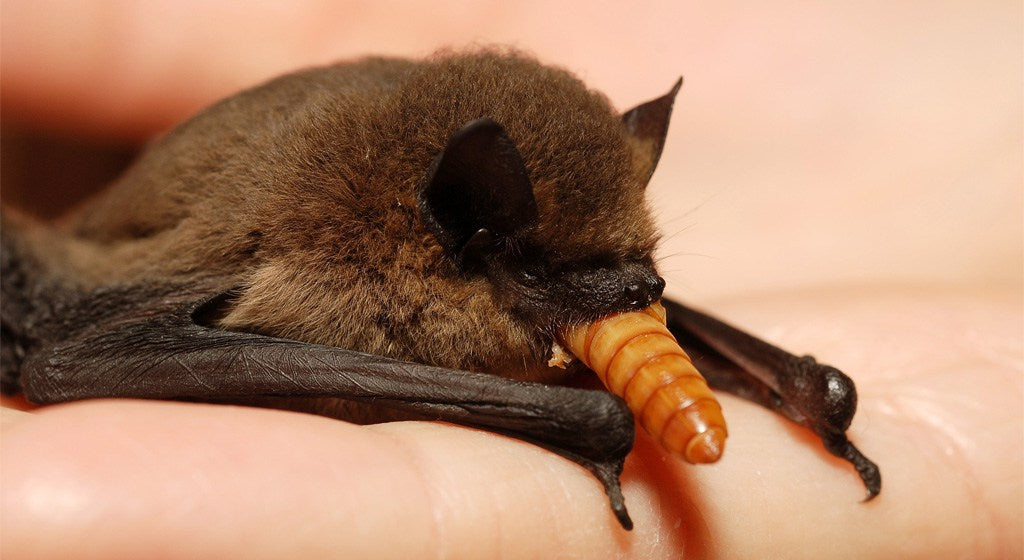
We love our super worms. They are cuddly, squirmy, joyful, and full of good humor. And in addition to their great personality, they are also full of protein. Which makes them a great feeder choice for many of your reptile friends. And you'll think they're playing a disappearing act when you see how fast leopard geckos love to eat them.
Our super worms are raised in a similar setting as our crickets. We grow them on our Florida farm, and feed them the same nutritional fruits from the sunshine state. But although they are full of protein, they area also a very fatty critter. These guys might be better served as a weekly snack food. Unlike the lean cricket, the nutritional composition of a superworm can make your pet over weight. And since they're already caged up, it's not easy for them to maintain an exercise routine. So although we love the super worms, we still recommend using crickets as a routine feeder.

One common misconception to keep in mind is that superworms should not be refrigerated. Although they are similar to mealworms, and even come from the same genus, it's important to know that they should not be raised in the same fashion. Basically, putting your superworms in the refrigerator will not do them well, unlike mealworms.
Black Soldier Fly Larvae
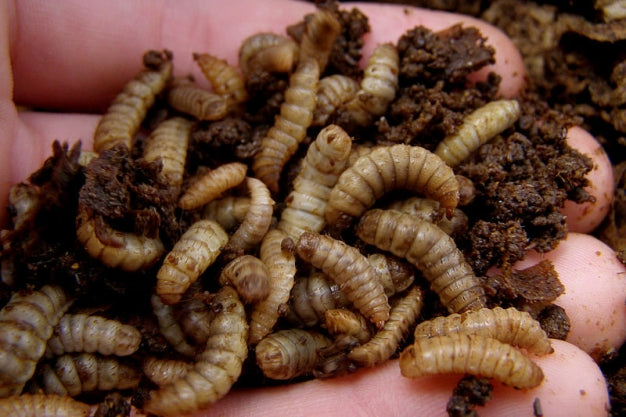
Black soldier fly larva are some of the most beneficial critters you can feed your pets. We raise them because they are a diverse snack that can also offer a nutritional boost for any diet. They are also known as phoenix worms, rept worms, or calciworms. But no matter what they're known as, let it be known that they are an excellent source of protein for your pet.
But if you're an avid gardener, then the BSFL can benefit you with their exceptional composting abilities. These guys are voracious eaters, and will rapidly devour a well fed compost bin. They are the best composting worm because they will consume meats, dairy, egg, citrus, and many other foods that traditional composting can't tolerate. Their waste product (called BSFL Frass), is a coveted fertilizer that reaps many nutritional benefits for plants.
Discoid Roaches for Sale
Unknown to many reptile owners, the Discoid Roach is an excellent feeder insect, that is very similar to dubia roaches, and which makes them a great feeder. They have more moisture, protein, and calcium than dubias. For these reasons, many breeders consider discoid roaches to be a superior feeder insect. And the difference between the discoid and dubia roach goes well beyond just nutritional value.
Another important feeder is that discoid roaches are legal in the state of Florida. As many Florida residents know too well, dubia roaches are outlawed. This means that discoids are a wonderful alternative, because they are welcomed by the swampy state of Florida.
Although discoids are well-received, and offer more calcium than crickets, they still need to be dusted. Dusting is a simply process, where you lightly shake your feeders in a baggie filled with calcium dust. This ensures that your reptile gets the critical calcium they need to prevent terminal disease like metabolic bone disease.
Dubia Roaches for Sale
Dubia roaches are known as one of the best feeder insects to offer bearded dragons, leopard geckos, and any other insect-munching pet. And although they are roaches, they don't transfer diseases like cock roaches. They are prolific breeders, and provide a great amount of nutrition that can't be found in crickets or superworms.
Nutritionally speaking, dubia roaches offer pets lean protein, with little fat consumption. This is comparable with crickets, which are also a lean protein. But something dubias do have is higher calcium. Reptiles need a lot of calcium to prevent metabolic bone disease. And dubias offer more of this vital nutrient, which makes them an excellent feeder option. But keep in mind, it is still recommended to dust them, just as you would crickets or superworms.
Dubia roaches should be gut-loaded, just like any other feeder. But one unique feature about dubias is that they have evolved with a 3-day digestive track. This means that they can load up and store more nutritional food than crickets. And, they have special enzymes which converts the food into more nutrients that bearded dragons can benefit from.
One concern that many people have when handling roaches is the diseases they are carrying. And this is a valid concern, because cock roaches are pretty filthy. However, dubia roaches are not the same, and are a high quality of insect. They are prolific groomers, and are frequently cleaning themselves, and they prefer to feast on fresh vegetation. And this is a reason why that are outlawed in Florida.
Hornworms for Sale

Hornworms are a great feeder option for bearded dragons and leopard geckos. They can grow into an impressive 3+ inches in length, which makes them a hearty snake for your pet. But due to this size, you'll want to save them for larger pets. Or offer smaller sized hornworms to your pets. But remember, hornworms are notorious for their ability to double in size in 5 days. So you'll either need to feed them off quickly, or store them at about 55 degrees F. This will slow down their growth, and also their metamorphosis.
Hornworms are loaded with protein, but a little light on fat. So you'll want to use a fatty feeder at the same time (like superworms). Hornworms are also not suitable to be used as a stable feeder because their calcium to phosphorus ratio is unknown. They are an understudied insect, which means there isn't as much nutritional information available. So it is recommended to dust them with calcium dust prior to offering them as food.
How quickly an insect reproduces has a lot of influence on the price for those insects. Hornworms reproduce very slowly, which increases their scarcity, which increases their price. For example, 25 medium hornworms will cost about $26. But 1000 crickets will cost $25. So you get much more protein and nutrients from crickets than hornworms for the same cost. This is another reason why hornworms aren't a common staple feeder.
Baby Chicks For Sale
Egg Laying Chicks

Our chickens love eating our insects so much that it made sense to start a chicken hatchery. So we started raising egg laying chicks. We offer both Novogen brown and white. These are leg horn chickens, and will start to lay about 1 egg per day once they mature. But they will only lay 1 egg per day for about 1 year. After that, their production decreases drastically. Many chicken keepers will butcher their hens for meat. But many chicken keepers also grow fond of their feather friends and keep them around for companionship.
When you get your baby chicks delivered, it's critical to have a brooder set up. Their brooder needs specific bedding, heat, food and water. We wrote this thorough guide on how to set up a brooder for your chicks so that you get off to a great start.
Baby Chicks for Snakes and Reptiles

Mice and rodents are the most common feeder for pythons, boas, and other large snakes. But when compared to baby chicks, rodents are less nutritional. Live chicks are a great food option for snakes because they have more lean protein, and less fat. But what makes baby chicks even better than rodents is that they can be offered as live prey. Rodents should never be offered as live prey because they will defend themselves with their sharp teeth. Chicks are defenseless and do not have enough strength to harm a snake with their beak or feet. Because many snakes need their frozen rodents dangled to entice them, a live chick is a great option to stimulate your snake's natural striking abilities.
Because baby chicks are shipped and delivered alive, there will be some nuances involved for the snake owners. Depending on which snake you have, your snake will be able to the baby chicks for a few weeks. After a few weeks, the chicks will eventually grow, and may be too bi (especially if you have a python). To preserve their size, snake owners will have to freeze their live chicks and use them at another time. Here's how snake owners can feed live chicks to their snakes.
Setting Up Pet Habitats
Raising critters and selling critters may be our forte. However, we're just as concerned and focused on how to get your pet properly set up. And their set up can include a variety of different options, depending on what type of pet you're caring for. Our pet care guides are written by our in-house zoologists, who have years of hands-on experience with many reptiles, amphibians, and other exotic pets. If our articles and guides don't answer your questions, we encourage you to post your questions on our community-focused reptile forum. Here, you'll receive instant help from our herp-loving community and in-house zoologists who help moderate the forum.
Reptile Tanks
Your favorite reptile or amphibian needs a home. And reptile tanks will serve well for this purpose. However, there are many tanks on the market, and knowing which one is right for your pet can be a challenge. Some questions you'll need to know are:
- Does my pet prefer horizontal or vertical habitats?
- Does my pet need a screened lid?
- How often will I need to clean his/her habitat?
- Does my pet need UVB light?
Knowing the answers to these questions will help direct you in the right direction. And this is important, because a bearded dragon won't do well in a vertical tank. And poison dart frogs prefer vertical tanks. So do your pet a favor, and don't screw this up.
Reptile Foggers
Humidity levels aren't a typical concern for humans. But they can be a major concern for reptiles and amphibians. Some reptiles require high humidity levels to help them shed their skin. Healthy shedding will allow the old skin to flake off completely. Inadequate shedding can tighten around the feet and strangle the toes, causing them to fall off. And this would make for an unpleasant experience for your beloved pet. So take the proper time to identify the best reptile fogger for your pets' satisfaction.
Popular Reptile & Amphibian Pets
Bearded Dragons
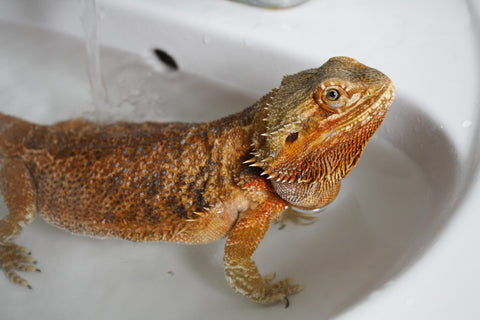
Bearded dragons are some of the most popular reptile pets in America. They are well adored for their unique appearances and personalities. And if properly cared for, can live up to 20 years! But all the joy and fun they offer comes at a cost. So it's important to understand the idiosyncrasies and a bearded dragon's care requirements to ensure they're well taken care of. Our comprehensive care instructions will cover the following critical topics:
- how to set up a bearded dragon habitat
- how to clean and sanitize a their habitat
- how to give a bearded dragon a bath
- how often to feed a fearded dragon
- and what to feed them
Although bearded dragons are adorable, a lot of considerations need to be made before owning one. And the most important one is where to buy a bearded dragon? Most people will probably think that a Big Box pet store is fine. However, it's been proven that those stores find their dragons at commercial operations with low husbandry and genetic standards. Therefore, it's in your best interest to acquire one from a reputable bearded dragon breeder.
Another important consideration is cost and care requirements. A bearded dragon requires cage cleanings, feeders, supplements, and habitat set up. All of this comes at a reoccurring cost, that every potential owner needs to be aware of. And don't think there are ways to mitigate these expenses. Bearded dragons are beautiful animals, and if properly cared for, they can avoid terminal diseases. So it's important to fully understand all the bearded dragon costs before owning one of these wonderful pets.
And if you're having any trouble, you can always ask questions on our bearded dragon forum. Post pictures of your dragon, or pictures of your habitat, and you'll get great support from our interactive community.
Leopard Gecko Care
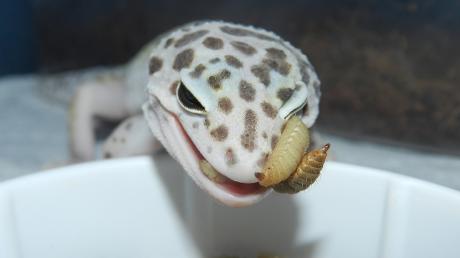
Leopard geckos are another popular reptile pet. They'r'e fun and exotic, and appreciate the love and attention offered by their owners. But just like with Bearded Dragons, leopard geckos have specific care instructions. So it's critical for the owners of these beautiful pets to understand the needs and necessities to ensure a leopard gecko can live a full and happy life. And if properly cared for, a leopard gecko can live up to 20 years, just like a bearded dragon. So we wrote a comprehensive leopard gecko care guide to help new and existing owners provide an enriched life for their pets. Here's what they can learn:
- how to set up a leopard gecko habitat
- how to use a reptile fogger to maintain specific humidity levels
- how to clean and sanitize a habitat
- how often to feed a leopard gecko
- and what a leopard gecko likes to eat
When setting up a leopard gecko habitat, one of the most important considerations to make is the temperature. Leopard geckos naturally live in desert areas, where temperatures can consistently reach 110 degrees F. This is why it's critical for their habitat to accommodate the proper leopard gecko temperature. Without the proper temps, their cold-blooded bodies will not be able to regulate the internal temps their bodies need. This can lead to terminal effects.
If your noticing problems with your leopard gecko, we always recommend seeing an exotic reptile veterinarian near me. They'll have experience with amphibians and reptiles, and will be able to diagnose and care for your beloved Leo.
Ball Python Care

Ball pythons are the most popular pet python in the world. They are very shy and docile, which makes them a great snake for beginner keepers. The come in manageable sizes, meaning you don't need to commit an entire room in your house as an enclosure. Adult males will grow as large as 3 feet in length, while females can reach 5 feet. Ball pythons at these sizes will need a 30 gallon tank.
Domesticated ball pythons can live up to 40 years. So if properly cared for, ball pythons can be a life-long member of your family. Our care guide, composed by our zoologist with hands-on experience covers these critical steps to ensure a long and happy life:
- how to set up a ball python habitat
- best substrate for a ball python
- how to clean and sanitize a ball python's habitat
- how often to feed your ball python baby chicks












